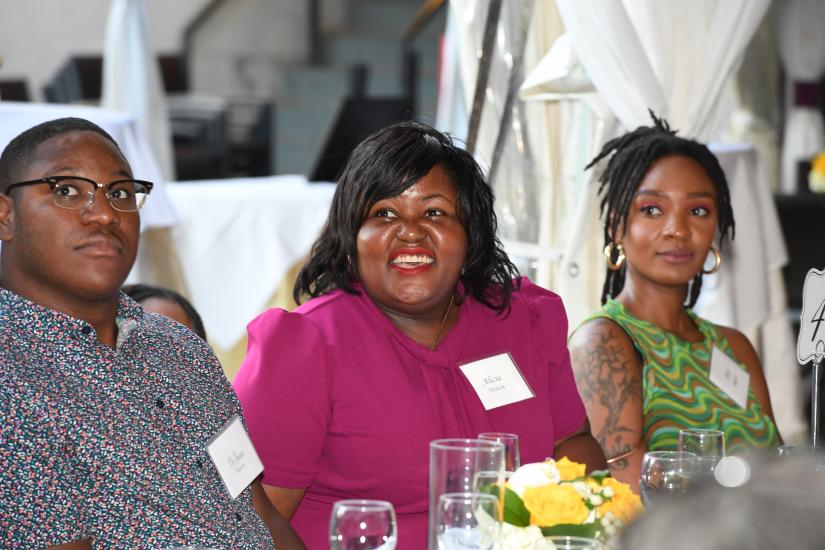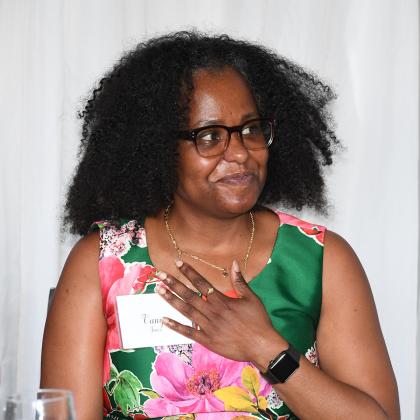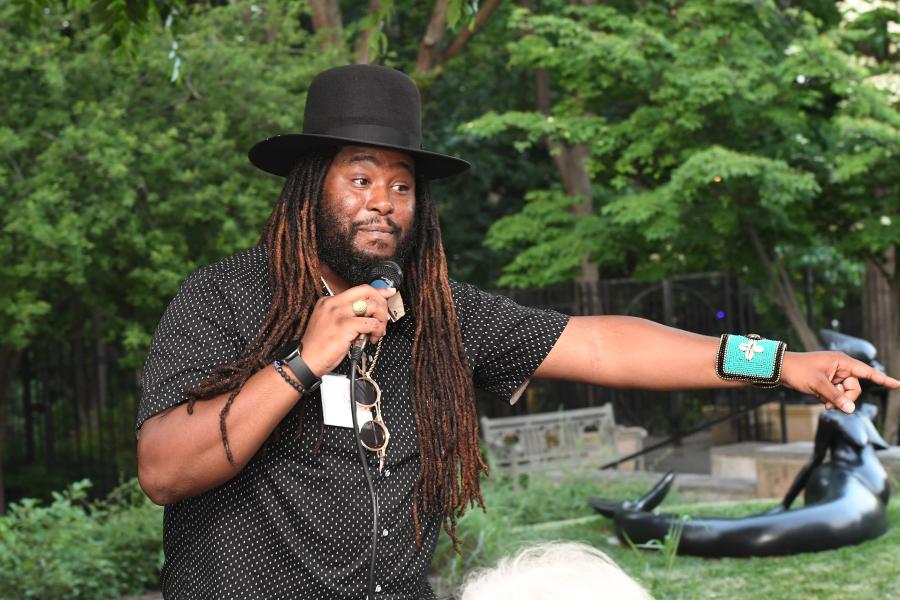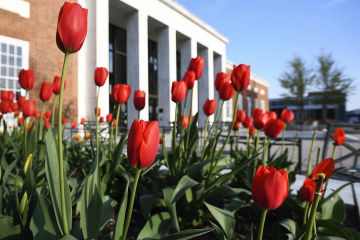Johns Hopkins University's Innovation Fund for Community Safety is a four-year, $6 million initiative to support community programs in Baltimore that aim to address the root causes of violence in the city. Launched nearly two years ago, it's a novel approach to public safety that looks to community organizations for creative solutions, then backs their ideas with funding, the expertise of Hopkins scholars, and other supports.
Leaders from Johns Hopkins and the community gathered at Gertrude's restaurant on June 15 to celebrate a successful first year of partnerships. Guests included representatives of the nine projects selected last summer to receive grants of up to $200,000 annually. Collectively, these projects support 30 community partners serving nearly 16,000 Baltimore residents in Charles Village, Homewood, and East Baltimore.
"As we talked about issues of safety and security on our campus, in our neighborhoods, in all of Baltimore, what I kept hearing again and again was the need for partnership—you must take advantage of the expertise, experience, and conviction of partners in the community," university President Ron Daniels told guests. "But it's also important that we forge ties with faculty, students, and staff at the university, and that those ties should not be one-way or didactic. And you all have made that a reality. I thank the selection committee and all our friends here tonight who had the imagination and courage to think differently about what you might do."
The inaugural projects support community organizing, education, job training and creation, and public safety efforts with a focus on violence prevention rather than intervention.
"If Baltimore is going to address the real challenges of safety and violence, it's going to take a whole lot of people working together in pursuit of solutions, and I think that is the magic of the Innovation Fund," said Vanya Jones, an associate professor at the Johns Hopkins Bloomberg School of Public Health and co-chair of the advisory committee that helped select the grant recipients. "The amazing thing about this is how truly collaborative the entire process has been. … Everyone needs to own this process in order for the process to work. We're seeing the fruits of those labors."

Image caption: Alicia Wilson (center), vice president for economic development at the Johns Hopkins University and Johns Hopkins Health System.
Image credit: Jim Burger for Johns Hopkins University
While the full impact of the work will not be known for some time, Jones pointed to two key indicators of success in year one: first, that grant recipients are doing what they said they would do and meeting key milestones; and second, that the projects are reaching at-risk populations, including young people, a focal point of Jones' violence prevention research.
David Fakunle serves as project lead for a program that works with individuals dealing with the trauma of substance use disorder, employing a holistic approach that "addresses mental health, emotional health, spiritual health, physical health, as well as financial health," he said. The program, called Existential Determinants of Health, relies on the intentional use of arts and culture—creative expression, theater, storytelling, drumming—to cultivate healing through what Fakunle called "the transformative power of creativity."
For Fakunle, who earned a PhD in mental health from the Bloomberg School in 2018 and remains adjunct associate faculty there now, the idea is an extension of the work he has long been a part of at WombWork Productions, a Baltimore-based social change performing arts company of which Fakunle is president and executive director. WombWork, along with Virtues Matter, applied for Innovation Fund support for its program concept; the program now serves 25 participants at weekly sessions, and the group is preparing to perform at a street fair next month outside Baltimore's National Great Blacks in Wax Museum.
"We're doing good work. We're trying to make this city better," Fakunle said. "That's the point of the Innovation Fund, and that's the point of the awardees who received the funds. We work together, we help each other."
Another grantee is the Baltimore Legacy Builders Collective, a collaboration of three organizations, B-360, I AM MENtality, and The Be. Org. Together, they provide social-emotional learning, education, and workforce development programming to youth and young adults in Baltimore. One innovative component of their project connects Baltimore's dirt bike culture—young people who display intrepid abilities on motorbikes and three-wheelers—with STEM education.

Image caption: Vanya Jones, associate professor, Johns Hopkins Bloomberg School of Public Health
Image credit: Jim Burger for Johns Hopkins University
"Our mission is to disrupt the prison pipeline and end the cycle of poverty," says Ebony Larry, program manager for Baltimore nonprofit B-360, which focuses on the dirt bikers. "These young people know how to fix their dirt bikes and customize them, but they don't know how to transfer those skills and passions. We go into rec centers, schools, and other organizations and teach an intro to engineering class related to dirt bikes. We want to create pathways for Black and brown kids to go into STEM careers."
Alicia Wilson, vice president for economic development for the university and health system, is one of the Innovation Fund for Community Safety's co-leaders and was thrilled to see that all the participants' hard work—much of it under "COVID lockdown" conditions—was acknowledged and celebrated.
"The Innovation Fund for Community Safety empowers community-led organizations to do what we do at Hopkins every day: draw upon our brilliance with the resources at our disposal to create what we believe are solutions to real-life problems," Wilson said at the dinner. "It's really a blessing that community organizations are given the same opportunity to do this, and under their own leadership."
Posted in University News, Community









